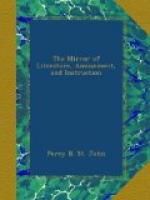Expeditious locomotion, to the commercial world more particularly, in every mercantile transaction, is equivalent to capital: and such is the vast importance of economy of time here, that no extra expense is considered as too great to accomplish the utmost speed. We have this practically illustrated in the preference which society gives to a complicated machinery put into motion at an enormous expense, to travelling by the winds of heaven which cost nothing.
To the merchant time gained is equal to money: for time occupied in travelling is just so much profitable employment lost. Time occupied in the transport of goods is equivalent to so much interest of capital spent: for a thousand pounds invested in merchandise is unproductive so many days as the transport is tedious. That part of the capital of an individual which is employed in the carrying of his goods to and from market, is so much abstracted from his means of producing more of the article in which he exerts his ingenuity and labour, whether it be in agriculture or manufacture.
Easy communication lessens the time occupied in the transport; and a saving of time lessens the distance, or our notion of distance. This effects a saving of money: and a saving of money permits of a greater employment of capital. The man who can only afford to keep one traveller soliciting orders for his goods, will thus be enabled to keep two; because the expense of travelling will be reduced a half. Or it may be, he will find it more advantageous to employ the saving in the production of a more delicate and desirable article in the way of his trade. The increased traffic from place to place will give likewise an impulse to business, which, in the present stagnant times, is most desirable. The manufacturer in Scotland will find the London market more easily arrived at: and the merchant in the metropolis will be able to get his orders more rapidly given and executed. A conveyance which, in good management, would be a weekly one, is, in bad management, a monthly one: and the carrier is obliged to quadruple his charge for the transport. To meet this charge the merchant has to add to the cost of the article, and so on throughout the various gradations of mercantile transition, until the consumer pays the necessarily increased price. Hence, whatever reduces the price of transportation, reduces the price of the commodity transported. Whatever reduces the traveller’s time, reduces his claim for compensation, and (competition being always at work) he is content with a smaller profit upon his merchandise. If a scarcity of any article occurs at one point of the kingdom, the monopolist there cannot continue his increased price for any duration of time. Commerce may, in this respect, be resembled to water, for, if not obstructed, it will always circulate till it finds its level. An opening or channel being furnished, an equalised supply will make its way wherever required.




